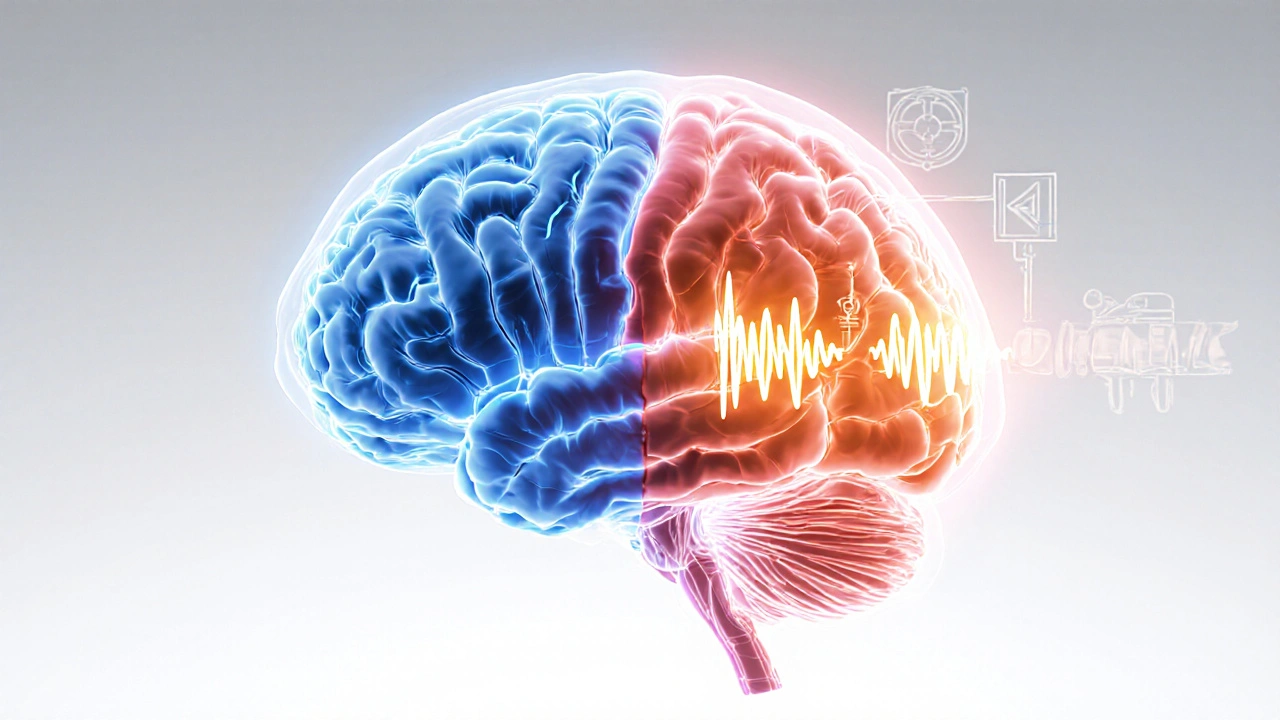Tinnitus Impact on Concentration Calculator
Your Concentration Impact Analysis
Severity:
Daily Focus Time:
Stress Level:
Sleep Quality:
Higher score indicates better concentration despite tinnitus
When a high‑pitched ring or buzzing fills your ears, it’s not just annoying - it can hijack your brain’s ability to stay on task. Tinnitus is a perception of sound without an external source, affecting roughly 15% of adults worldwide. It varies from a faint hiss to a constant roar, and its presence often leaks into every mental activity you try to perform. This article breaks down exactly how tinnitus messes with concentration and focus, what triggers make it worse, and practical steps you can take to protect your cognitive performance.
Key Takeaways
- Tinnitus competes for attentional resources, making sustained concentration harder.
- Stress, poor sleep, and background noise amplify the cognitive drain.
- Sound therapy, CBT, and simple workspace tweaks can restore focus for most people.
- Monitor your symptoms and seek professional help if concentration loss interferes with work or studies.
Why Tinnitus Steals Your Attention
Our brain constantly filters out irrelevant sounds so we can focus on the task at hand. Concentration relies on that filter. Tinnitus creates a persistent internal noise that the brain cannot mute, forcing the auditory cortex to keep processing it. This extra load saps the limited pool of neural resources needed for attention, a phenomenon researchers call “cognitive load interference.”
Imagine trying to read a textbook while a neighbor plays a live‑concert through thin walls. Even if you can hear the music, you still manage to read because you can consciously suppress it. Tinnitus, however, is woven into the very neural pathways that handle sound, making the suppression effort unconscious and far more draining.
How Focus and Memory Get Clouded
Focus is the ability to keep attention on a single point for a period of time. When tinnitus spikes, the brain’s default mode network - which handles mind‑wandering - becomes over‑active, leading to frequent attention shifts. Studies using functional MRI show reduced activity in the prefrontal cortex (the region governing executive function) during tinnitus episodes, directly linking the sound to poorer decision‑making and slower reaction times.
Memory isn’t immune either. Working memory, the mental scratch‑pad for holding information briefly, drops by up to 20% in people with severe tinnitus. That means remembering a phone number or following a multi‑step instruction becomes noticeably harder.
What Makes the Mental Fog Worse?
Three main culprits act like turbo‑boosters for the tinnitus‑induced concentration dip:
- Stress: Cortisol spikes heighten auditory sensitivity, turning a faint ring into a roar.
- Sleep deprivation: Poor sleep reduces the brain’s ability to filter noise, so the ringing feels louder the next day.
- Background noise: Open‑office chatter or city traffic adds external sound, compounding the internal noise and overwhelming the auditory filter.
Even mild anxiety can cause the brain to "hyper‑listen" to tinnitus, creating a feedback loop where worry amplifies ringing, which then fuels more worry.
Real‑World Snapshots
- Office worker: Jenna, a data analyst, finds her spreadsheets taking twice as long when her tinnitus flares after a long‑day meeting. The constant buzzing pulls her focus away from column calculations, leading to more errors.
- College student: Marco, studying for finals, notices he rereads the same paragraph multiple times. His nightly tinnitus spikes after caffeine, making it hard to retain new information.
- Driver: Luis, a delivery driver, reports that sudden loud horns worsen his ringing, causing momentary lapses in road awareness.
These scenarios illustrate a common thread: the mental effort required to push tinnitus into the background reduces the energy available for any other cognitive task.

Effective Strategies to Protect Your Concentration
Fortunately, a mix of environmental, behavioral, and therapeutic approaches can reclaim your focus.
1. Optimize Your Listening Environment
- Use low‑level background music or white‑noise apps to mask the ringing without adding distraction.
- Invest in noise‑cancelling headphones set to a comfortable volume; the goal is to blend tinnitus into a pleasant soundscape.
- Keep your workspace quiet-close doors, use acoustic panels, or schedule focus blocks during quieter office hours.
2. Sound Therapy
Sound therapy introduces external sounds (white noise, nature recordings, or customized tinnitus‑masking tracks) that retrain the brain’s auditory pathways. Over weeks, patients report a 30‑40% reduction in perceived loudness and a noticeable boost in attention span.
3. Cognitive Behavioral Therapy (CBT)
Cognitive Behavioral Therapy helps reframe the emotional reaction to tinnitus. By reducing anxiety and catastrophizing thoughts, CBT lowers cortisol levels, which in turn quiets the ringing. Clinical trials show CBT improves concentration scores by an average of 12 points on the Stroop test.
4. Mindfulness and Relaxation
- Practice 5‑minute breathing exercises before starting a demanding task.
- Try guided meditation apps that focus on “sound awareness” to gradually desensitize you to the ringing.
- Regular yoga or tai chi can lower stress hormones, indirectly easing tinnitus intensity.
5. Sleep Hygiene
Maintain a consistent bedtime, keep the bedroom cool, and avoid screen exposure an hour before sleep. Better sleep sharpens the brain’s filtering mechanism, making tinnitus less intrusive.
6. Medical Options
When tinnitus is tied to an underlying condition (e.g., ear infection, medication side‑effects), treating that cause can clear the fog. In some cases, low‑dose antidepressants or anti‑anxiety meds are prescribed to curb the stress response.
Comparison of Impact Levels and Coping Strategies
| Severity | Typical Concentration Impact | Best‑Fit Strategies |
|---|---|---|
| Mild (buzz occasional) | Minor distraction, easily ignored | Background white‑noise, short mindfulness breaks |
| Moderate (constant hum) | Reduced attention span, occasional memory lapses | Sound therapy, CBT, structured work‑blocks |
| Severe (loud roar) | Frequent focus loss, serious productivity drop | Full‑time maskers, professional CBT, medical evaluation |
Quick Checklist to Boost Focus When Tinnitus Flare‑Ups Hit
- Eliminate sudden loud noises in the environment.
- Activate a low‑volume sound‑masking app for the next 30 minutes.
- Take a 5‑minute deep‑breathing break before returning to the task.
- Write down one distracting thought and set it aside for later.
- Schedule a short walk or stretch to reset cortisol levels.
- Log the severity of your tinnitus and any factors that might have triggered it.
Repeating this routine daily builds a habit that trains your brain to compartmentalize the ringing, preserving your mental stamina.
When to Seek Professional Help
If you notice any of the following, it’s time to schedule an appointment with an audiologist or ENT specialist:
- Concentration loss interferes with work deadlines or academic performance.
- Tinnitus disrupts sleep more than three nights a week.
- Accompanying symptoms like dizziness, hearing loss, or ear pain arise.
- Stress and anxiety levels skyrocket despite self‑help efforts.
Early intervention often prevents the mental fog from becoming chronic and opens the door to tailored treatment plans.
Frequently Asked Questions
Can tinnitus make you forget things?
Yes. The constant noise taxes working memory, so you may find it harder to hold short‑term information like phone numbers or step‑by‑step instructions.
Is there a “cure” for tinnitus‑related concentration loss?
While a universal cure remains elusive, many people regain focus through sound therapy, CBT, and lifestyle tweaks. Treating any underlying medical cause also helps.
Do certain foods worsen tinnitus and focus problems?
High‑salt meals, caffeine, and alcohol can raise blood pressure, which may intensify tinnitus. Reducing these can indirectly improve concentration.
How long does it take for sound therapy to show results?
Most users notice a modest reduction in perceived loudness after 2‑4 weeks of daily use, with significant focus gains appearing around the 6‑week mark.
Can exercise help with tinnitus‑induced focus loss?
Regular aerobic exercise lowers stress hormones and improves sleep quality, both of which dampen tinnitus intensity and free up mental bandwidth.
Next Steps
Start by tracking your tinnitus severity alongside your daily tasks for a week. Notice patterns-does a stressful meeting make the ringing louder? Use the checklist above during your most challenging work blocks. If concentration continues to suffer, reach out to a hearing specialist for a personalized plan.
Remember, the ring isn’t an unbeatable barrier. With the right mix of sound masking, mental training, and healthy habits, you can push the noise to the background and let your mind do what it does best-focus.


Hi, I'm Caden Lockhart, a pharmaceutical expert with years of experience in the industry. My passion lies in researching and developing new medications, as well as educating others about their proper use and potential side effects. I enjoy writing articles on various diseases, health supplements, and the latest treatment options available. In my free time, I love going on hikes, perusing scientific journals, and capturing the world through my lens. Through my work, I strive to make a positive impact on patients' lives and contribute to the advancement of medical science.